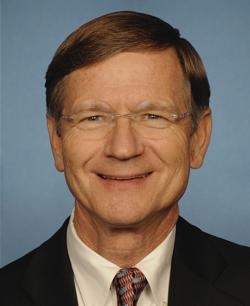Thu, Apr 30, 2015
Chairman Smith: 'We Must Continue To Invest In NASA As The Only Government Agency Responsible For Space Exploration'
The two-year NASA reauthorization bill introduced Tuesday by House Science, Space, and Technology Committee Chairman Lamar Smith (R-TX) (pictured) and lead sponsor Congressman Steven Palazzo (R-MS) and fifteen cosponsors has drawn letters of support from the Planetary Society, the Commercial Spaceflight Federation, and the Bay Area Houston Economic Partnership/Citizens for Spaceflight Exploration-Texas.

"This is a responsible bill based on previous bipartisan agreements that have already passed in the House of Representatives,” stated Chairman Lamar Smith. “For more than 50 years, the U.S. has led the world in space exploration. We must restore balance to NASA’s budget if we want to ensure the U.S. continues to lead in space for the next 50 years. And we must continue to invest in NASA as the only government agency responsible for space exploration.”
In addition to Chairman Smith, fifteen other members have co-sponsored Palazzo’s bill.
“I am pleased to introduce this bill with strong support from my colleagues on the House Science, Space, and Technology Committee and many of our friends in the space community,” stated the bill’s lead sponsor, Congressman Steven Palazzo. “We all want NASA to be successful so that America can continue to lead the world in space. American leadership in space is a matter of both national pride and national security. We will continue to support NASA with the resources and the guidance it needs to lead the way into the future.”
In a letter to Chairman Smith and Ranking Member Eddie Bernice Johnson (D-TX), Planetary Society Director of Advocacy Casey Dreier praised the Committee’s “scientifically ambitious, affordable plan of solar system exploration” as well as the bill’s “clear directives and support for [NASA’s] future exploration.” The Planetary Society, led by CEO Bill Nye, is considered one of the largest and most influential public space organizations in the world.
The Commercial Spaceflight Federation (CSF), which represents more than 50 commercial space companies across the United States, also expressed its strong support for the bill, citing “the Committee’s increased support for the Commercial Crew Program” and the bill’s ability to “restore America’s capability to launch American astronauts on American rockets from American soil by 2017 and end our sole reliance on Russia.”
The Bay Area Houston Economic Partnership/Citizens for Spaceflight Exploration-Texas called the Committee’s bill a “strong endorsement of America’s space exploration program” because of its support of the “nation’s global national security interests, technological innovation and competitiveness, high-tech jobs and future workforce opportunities, STEM education and quality of life improvements.”

The NASA Authorization Act for 2016 and 2017 is a two-year, budget-neutral bill that continues the consistent guidance Congress has given to NASA for nearly a decade by reaffirming a stepping stone approach to exploration. The bill’s policy provisions largely mirror that of the House-passed NASA Authorization Act of 2015, a one year bill that passed with unanimous bipartisan support in February 2015.
The new bill focuses NASA’s efforts to develop a capability to access the International Space Station so that we can once again launch American astronauts on American rockets from American soil. It also increases support for the Space Launch System and the Orion Crew Vehicle – systems being developed to take astronauts to deep-space destinations like Mars – in an attempt to keep the programs on schedule for a 2017 launch date. The Obama administration has consistently cut funding for these human space exploration programs, while increasing funding for the Earth Science Division by more than 63 percent. The bill provides authorization levels consistent with NASA’s budget request, providing that current restraints within the Budget Control Act are satisfied.
The bill also supports a healthy science directorate that reflects the input from the scientific community and an aeronautics research directorate that contributes to our nation’s aerospace economy.
The markup will take place on Thursday, April 30th at 11:00 a.m. ET.
More News
Terminal Radar Service Area Airspace surrounding designated airports wherein ATC provides radar vectoring, sequencing, and separation on a full-time basis for all IFR and participa>[...]
Aero Linx: Utah Back Country Pilots Association (UBCP) Through the sharing experiences, the UBCP has built upon a foundation of safe operating practices in some of the most challen>[...]
From 2010 (YouTube Edition): Imagine... Be The Change... Inspire FROM 2010: One of the more unusual phone calls I have ever received occurred a few years ago... from Anousheh Ansar>[...]
(Pilot) Felt A Shudder And Heard The Engine Sounding Differently, Followed By The Engine Chip Detector Light On April 14, 2025, about 1800 Pacific daylight time, a Bell 206B, N1667>[...]
Also: AMA Names Tyler Dobbs, More Falcon 9 Ops, Firefly Launch Unsuccessful, Autonomous F-16s The Air Force has begun ground testing a future uncrewed jet design in a milestone tow>[...]
 ANN's Daily Aero-Term (05.07.25): Terminal Radar Service Area
ANN's Daily Aero-Term (05.07.25): Terminal Radar Service Area ANN's Daily Aero-Linx (05.07.25)
ANN's Daily Aero-Linx (05.07.25) Classic Aero-TV: Anousheh Ansari -- The Woman Behind The Prize
Classic Aero-TV: Anousheh Ansari -- The Woman Behind The Prize NTSB Prelim: Bell 206B
NTSB Prelim: Bell 206B Airborne-NextGen 05.06.25: AF Uncrewed Fighters, Drones v Planes, Joby Crew Test
Airborne-NextGen 05.06.25: AF Uncrewed Fighters, Drones v Planes, Joby Crew Test




